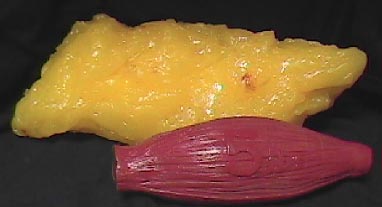Muscle vs. Fat = They weigh the same, so why does the scale

gracienkaidens_momma
Posts: 379 Member
(the rest of topic title)
increase when I exercise?
Please answer this for me. It's driving me nuts and really bothering me.
increase when I exercise?
Please answer this for me. It's driving me nuts and really bothering me.
0
Replies
-
In respect to running, since that's what I know about, there are several adaptations that will increase your weight. These two begin to happen fairly quickly.
Increased blood volume
Increased storage of glycogen and water in the muscle cells0 -
Your muscles tend to hold onto water/etc to repair themselves, which reflects on the scale. It's not "real" weight - it's just a change in the amount of water your body is holding into.0
-
I agree with the previous two posters.
The weight gain is not fat gain... it's water weight amoung a few other things that your muscles hold onto when you exercise.
One reason why my rest day is the day before my weigh in.0 -
Not sure exactly what you mean. Your topic seems spot on. 1 lbs of gold weights the same as 1 lbs of feathers as well.

Muscle density is higher than fat density, meaning a measure volume of muscle would weight more than the same volume of fat.
I guess logically this would mean that a bodybuilder with the same measurements as an overweight person would weight more than the overweight person.
If you are gaining weight in the gym, you might be gaining muscle, have your fat percentage checked and keep tabs on it.0 -
So you are saying this weight gain is probably just water weight? How do I get water weight to come off in a healthy manner?0
-
(the rest of topic title)
increase when I exercise?
Please answer this for me. It's driving me nuts and really bothering me.
muscle and fat do not weigh the same. You take a square cubic inch of fat and muscle. Muscle weighs more.
Women can hold water alot easier than men, watch your sodium, eat back your excersise calories, be patient.0 -
Well, the same amount of muscle and fat do not weigh the same, but if you are losing weight it's unlikely you'll increase muscle faster than you lose fat. Your increase is likely due to water.0
-
I have some people telling me they weigh the same and others telling me they don't. I don't know what to believe. I do know muscle is much more dense than fat and takes up much more space and if a 150 pound person is mostly muscle, he/she will look more toned and fit than a 150 pound person who is very flabby and does not work out. Just an example.0
-
Muscle weighs more lol! In the same amount of space, muscle weighs way more then fat, I dunno why people say it weighs the same, cause that's misleading. If u grab a piece of fat that's way larger then the piece of muscle, then it weighs the same, but that's not the way to look on it when it's on ur body, people are silly0
-
Muscle is more dense that fat so it weighs more by volume. If you had a cup of fat and a cup of muscle, the muscle would weigh more. Therefore, if you lose some fat but gain muscle, you could lose inches but gain weight.0
-
I don't understand why anyone thinks they will lose the exact same amount of fat on the same day they gain the exact same amount of muscle. Your body is always adjusting, sometimes the fat just takes a while to wander away, while the muscle is gaining mass. Sometimes it's the other way around.0
-
So you are saying this weight gain is probably just water weight? How do I get water weight to come off in a healthy manner?
You give it time. It will come off by itself without you doing anything. Don't worry so much about the scale.0 -
First of all, I'm not sure what you mean when you say they weigh the same. Muscle tissue is about 15% more dense than adipose (fat) tissue.
Second, are you taking about weighing yourself immediately before and after a workout? If so, hopefully you are drinking more water than you are sweating to stay hydrated. If this is the case, there will always be a gain after a workout.
There are so many things that influence the scale... hormones, tissue repair, electrolyte balance... For some people, the daily fluctuations are a distraction. If this is the case for you, weigh less frequently. What you want to shoot for are gradual changes in weight over time.0 -
I have some people telling me they weigh the same and others telling me they don't. I don't know what to believe. I do know muscle is much more dense than fat and takes up much more space and if a 150 pound person is mostly muscle, he/she will look more toned and fit than a 150 pound person who is very flabby and does not work out. Just an example.
Correct.0 -
A pound of fat DOES weigh the same as a pound of muscle. Same as a pound of feathers DOES weigh the same as a pound of lead. A pound is a pound. What makes the difference is the density of each0
-
From the very elementary and limited knowledge I have, it could just be that you're gaining more muscle and losing body fat. So you're staying the same size, but your weight goes up. Or if it's a one or two time thing, it could really be what you ate that day and when you're weighing yourself. Simple things such as weighing in the morning vs afternoon, before or after using the bathroom, before or after eating, etc all change your weight. The "ideal" time from what I've read is in the morning, before breakfast but after a bathroom stop, and before showering or getting dressed.0
-
I have some people telling me they weigh the same and others telling me they don't. I don't know what to believe.
The reason people argue about this is that when someone says "muscle weighs more than fat" some assume that means the same weight of each weighs differently, and others assume it means that the same volume of each weighs differently. Obviously the same weight of any 2 things isn't going to weigh differently, but in the case of muscle vs. fat the same volume will.0 -
So you are saying this weight gain is probably just water weight? How do I get water weight to come off in a healthy manner?
Water that your muscles use for repair is healthy and you don't want to get rid of it. This is not the same as when people say they ate a ton of sodium and want to lose the resulting water weight.0 -
You did not specify when you are seeing the weight gain as a previous poster said. Right after you had your workout? Do you see it over a period of time for instance gaining 1/2 lbs a week or what?0
-
I have some people telling me they weigh the same and others telling me they don't. I don't know what to believe. I do know muscle is much more dense than fat and takes up much more space and if a 150 pound person is mostly muscle, he/she will look more toned and fit than a 150 pound person who is very flabby and does not work out. Just an example.
Exactly, and as such, they do not weigh the same. Any moron knows a pound of something weighs the same as a pound of something else. I still don't understand why people insist on forcing this literally pointless statement on others. I mean...I MIGHT be able to trick my 4yr old into believing a pound of bolts weighs more than a pound of feathers....but I'm pretty sure my 6yr old wouldn't be fooled, and I KNOW my 14yr old would look at me like I was stupid.
When people are talking about weight, equal volume is AUTOMATICALLY IMPLIED, otherwise there could be no comparison! This is what makes your example valid.
Anyway, on topic...it's your body holding onto water for repair, plain and simple.0 -
(the rest of topic title)
increase when I exercise?
Please answer this for me. It's driving me nuts and really bothering me.
muscle and fat do not weigh the same. You take a square cubic inch of fat and muscle. Muscle weighs more.
Women can hold water alot easier than men, watch your sodium, eat back your excersise calories, be patient.
Your explanation suggests muscle is more dense than fat. This is correct.
Muscle does not, however, *weigh* more than fat.
You're talking about density, not weight.0 -
Try it for youre self. Go buy a steak, cut off the fat, find a way to measure, then cut the same sized piece from the Meat. Weight it, it won't be the same weight. I did it using a 1/4 measureing cup.0
-
Ok, simple way to example muscle vs fat.
5lbs of muscle will weigh the same as 5lbs of fat, but the fat will be bigger in size.
If you had a cube of fat and a cube of muscle both the same size, the muscle would weigh more.
But yeah, it's probably just water weight. You exercising and eating the correct amount of calories will help you lose weight, but don't weigh after you workout, as the muscles will be holding on to water. If I was you, I'd weigh first thing in the morning before having any food. You should keep it consistent. So weight once a week on the same day in the morning
I think that makes sense? 0
0 -
Technically that statement is true a pound of anything is exactly one pound weight however the size is drastically different. A pound of muscle takes about 40% as much space as a pound of fat. However in regards to weighing more after exercise this is easy. When people exercise more they drink more water or at least should. Your muscles use this water to deliver everything needed to repair themselves. You dont want to loose this "water weight" what you should do to make yourself feel better about it is to stop using the scale for about two weeks. Take measurements of yourself before the break. Then measure yourself after. Even if that scale says the same thing look at the measurements. They tell a much more reliable story of your health and improvement.0
-
So you are saying this weight gain is probably just water weight? How do I get water weight to come off in a healthy manner?
Water that your muscles use for repair is healthy and you don't want to get rid of it. This is not the same as when people say they ate a ton of sodium and want to lose the resulting water weight.
This.
It will equalise over time. And if you get used to how your body gains and loses water in relation to workouts, it won't bother you anymore. I know that I'll hold a few pounds after a heavy lifting workout. That's ok. I know it makes me look a *whole* lot better, makes me stronger, fitter and more able. That's far more important than a number on the scale.0 -

and its just water like everyone else said.. don't weigh after working out.0 -
So you are saying this weight gain is probably just water weight? How do I get water weight to come off in a healthy manner?
Typically your body holds on to water for a reason (i.e. repair) so I don't suggest you trying to deplete these water stores. If you are really concerned make sure you are drinking enough water and watching your sodium intake. If your sodium is high, you will need a lot of water to help flush it out of your system and balance your water levels.
Weigh yourself after a rest day, over time you will see a change in the scale.0 -
(the rest of topic title)
increase when I exercise?
Please answer this for me. It's driving me nuts and really bothering me.
Normally from retaining water. If you're not hydrated enough or new to exercise your cells will try to hold on to water since your body doesn't know what is going on yet and feels it needs to hold on to what water it can if not getting enough.0 -
(the rest of topic title)
increase when I exercise?
Please answer this for me. It's driving me nuts and really bothering me.
muscle and fat do not weigh the same. You take a square cubic inch of fat and muscle. Muscle weighs more.
Women can hold water alot easier than men, watch your sodium, eat back your excersise calories, be patient.
Muscle and fat do weigh the same! 1lb is 1lb .What you are refering to is density. 5 lbs of muscle is more dense than fat thus taking up less space. So in the end you are probably hanging on to water.0 -
Muscle and fat DO weigh the same.
You have a pound of fat, and a found of muscle. Which one weighs more? .... Exactly.
They just do different things to your body. Hold up 3 grapefruits to your stomach. That's 5 pounds of fat. Now hold 3 plums, or something very tiny. That's 5 pounds of muscle.
Is that clear?0
This discussion has been closed.
Categories
- All Categories
- 1.4M Health, Wellness and Goals
- 398.1K Introduce Yourself
- 44.7K Getting Started
- 261K Health and Weight Loss
- 176.4K Food and Nutrition
- 47.7K Recipes
- 233K Fitness and Exercise
- 462 Sleep, Mindfulness and Overall Wellness
- 6.5K Goal: Maintaining Weight
- 8.7K Goal: Gaining Weight and Body Building
- 153.5K Motivation and Support
- 8.4K Challenges
- 1.4K Debate Club
- 96.5K Chit-Chat
- 2.6K Fun and Games
- 4.8K MyFitnessPal Information
- 18 News and Announcements
- 21 MyFitnessPal Academy
- 1.5K Feature Suggestions and Ideas
- 3.2K MyFitnessPal Tech Support Questions


















